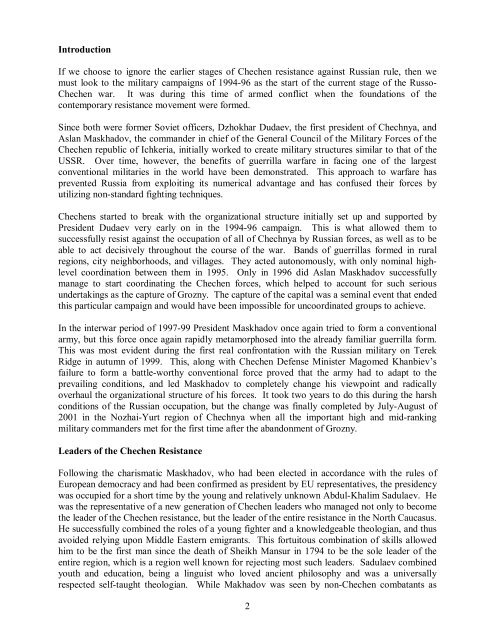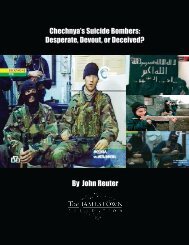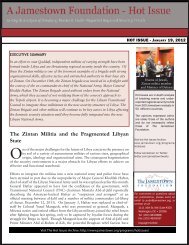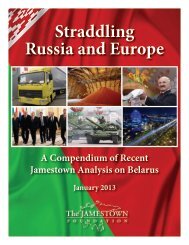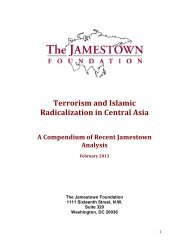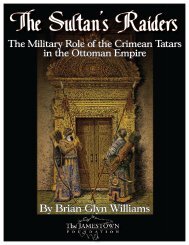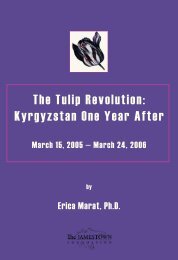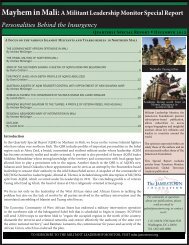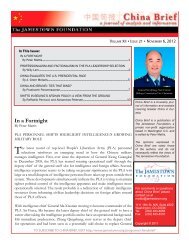The Chechen Resistance: Yesterday, Today and Tomorrow
The Chechen Resistance: Yesterday, Today and Tomorrow
The Chechen Resistance: Yesterday, Today and Tomorrow
- No tags were found...
Create successful ePaper yourself
Turn your PDF publications into a flip-book with our unique Google optimized e-Paper software.
IntroductionIf we choose to ignore the earlier stages of <strong>Chechen</strong> resistance against Russian rule, then wemust look to the military campaigns of 1994-96 as the start of the current stage of the Russo-<strong>Chechen</strong> war. It was during this time of armed conflict when the foundations of thecontemporary resistance movement were formed.Since both were former Soviet officers, Dzhokhar Dudaev, the first president of Chechnya, <strong>and</strong>Aslan Maskhadov, the comm<strong>and</strong>er in chief of the General Council of the Military Forces of the<strong>Chechen</strong> republic of Ichkeria, initially worked to create military structures similar to that of theUSSR. Over time, however, the benefits of guerrilla warfare in facing one of the largestconventional militaries in the world have been demonstrated. This approach to warfare hasprevented Russia from exploiting its numerical advantage <strong>and</strong> has confused their forces byutilizing non-st<strong>and</strong>ard fighting techniques.<strong>Chechen</strong>s started to break with the organizational structure initially set up <strong>and</strong> supported byPresident Dudaev very early on in the 1994-96 campaign. This is what allowed them tosuccessfully resist against the occupation of all of Chechnya by Russian forces, as well as to beable to act decisively throughout the course of the war. B<strong>and</strong>s of guerrillas formed in ruralregions, city neighborhoods, <strong>and</strong> villages. <strong>The</strong>y acted autonomously, with only nominal highlevelcoordination between them in 1995. Only in 1996 did Aslan Maskhadov successfullymanage to start coordinating the <strong>Chechen</strong> forces, which helped to account for such seriousundertakings as the capture of Grozny. <strong>The</strong> capture of the capital was a seminal event that endedthis particular campaign <strong>and</strong> would have been impossible for uncoordinated groups to achieve.In the interwar period of 1997-99 President Maskhadov once again tried to form a conventionalarmy, but this force once again rapidly metamorphosed into the already familiar guerrilla form.This was most evident during the first real confrontation with the Russian military on TerekRidge in autumn of 1999. This, along with <strong>Chechen</strong> Defense Minister Magomed Khanbiev’sfailure to form a battle-worthy conventional force proved that the army had to adapt to theprevailing conditions, <strong>and</strong> led Maskhadov to completely change his viewpoint <strong>and</strong> radicallyoverhaul the organizational structure of his forces. It took two years to do this during the harshconditions of the Russian occupation, but the change was finally completed by July-August of2001 in the Nozhai-Yurt region of Chechnya when all the important high <strong>and</strong> mid-rankingmilitary comm<strong>and</strong>ers met for the first time after the ab<strong>and</strong>onment of Grozny.Leaders of the <strong>Chechen</strong> <strong>Resistance</strong>Following the charismatic Maskhadov, who had been elected in accordance with the rules ofEuropean democracy <strong>and</strong> had been confirmed as president by EU representatives, the presidencywas occupied for a short time by the young <strong>and</strong> relatively unknown Abdul-Khalim Sadulaev. Hewas the representative of a new generation of <strong>Chechen</strong> leaders who managed not only to becomethe leader of the <strong>Chechen</strong> resistance, but the leader of the entire resistance in the North Caucasus.He successfully combined the roles of a young fighter <strong>and</strong> a knowledgeable theologian, <strong>and</strong> thusavoided relying upon Middle Eastern emigrants. This fortuitous combination of skills allowedhim to be the first man since the death of Sheikh Mansur in 1794 to be the sole leader of theentire region, which is a region well known for rejecting most such leaders. Sadulaev combinedyouth <strong>and</strong> education, being a linguist who loved ancient philosophy <strong>and</strong> was a universallyrespected self-taught theologian. While Makhadov was seen by non-<strong>Chechen</strong> combatants as2


